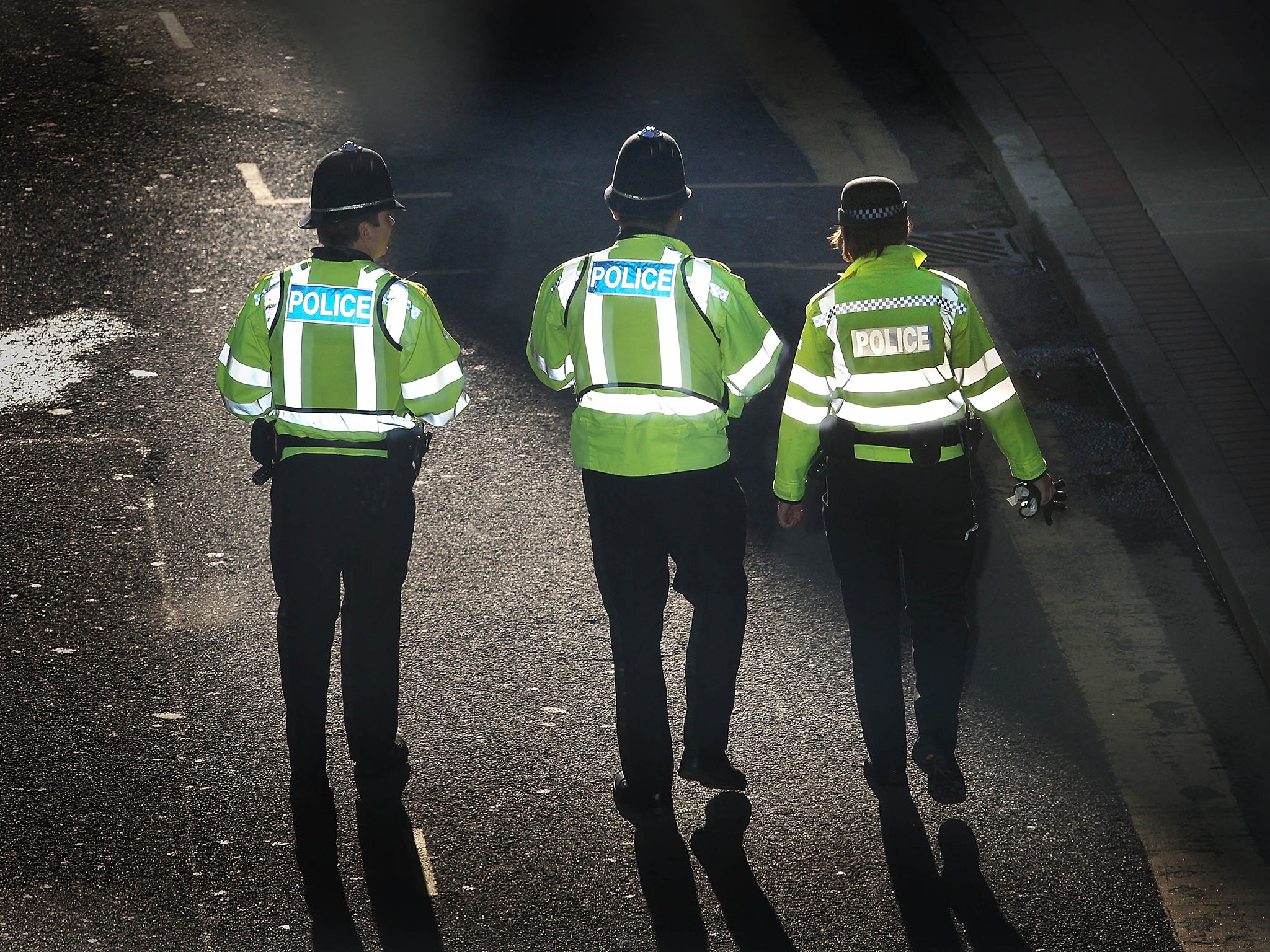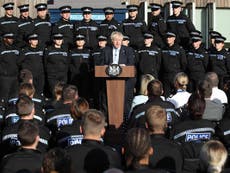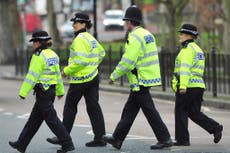Majority of police officers would not recommend job, survey finds amid recruitment drive
Boris Johnson has pledged to recruit 20,000 extra police officers by 2023

Your support helps us to tell the story
From reproductive rights to climate change to Big Tech, The Independent is on the ground when the story is developing. Whether it's investigating the financials of Elon Musk's pro-Trump PAC or producing our latest documentary, 'The A Word', which shines a light on the American women fighting for reproductive rights, we know how important it is to parse out the facts from the messaging.
At such a critical moment in US history, we need reporters on the ground. Your donation allows us to keep sending journalists to speak to both sides of the story.
The Independent is trusted by Americans across the entire political spectrum. And unlike many other quality news outlets, we choose not to lock Americans out of our reporting and analysis with paywalls. We believe quality journalism should be available to everyone, paid for by those who can afford it.
Your support makes all the difference.Almost two-thirds of rank-and-file police officers would not recommend their job to others, a survey has revealed.
It comes amid a national recruitment drive on which the government spent more than £750m in its first year. It hopes to hire 20,000 extra officers in three years.
But the poll of officers in England and Wales revealed concerns that there are not enough staff to train the incoming recruits, and that some regional forces will not hit their target.
In a report released on Wednesday, the Police Federation said 59 per cent of respondents would not recommend joining the police to others and only 20 per cent would.
The figure is an improvement on recent years, with more than three-quarters of officers saying they would not urge others to follow in their footsteps in 2015.
It follows a major advertising campaign encouraging people to join the police before Boris Johnson’s deadline of 2023 for the 20,000 uplift.
If achieved, it would not replace the net number of police officers lost since 2010 or cancel out a separate decline in staff that resulted in officers being put on back-office and administrative duties.
Last year, the chair of the National Police Chiefs’ Council (NPCC) said that 500,000 people may have to apply for the target to be reached.
Martin Hewitt warned that because of the number of officers who retire or leave every year, 50,000 new officers may have to be hired in total and only one in 10 applicants become a police officer after vetting and training.
A quarter of respondents to the Police Federation’s survey did not think that their force would be able to recruit the number of officers allocated for uplift, although one-third were more optimistic.
Concerns were also raised about the capacity to train the influx of new constables, after a decade of austerity saw disproportionate losses from more senior ranks.
“The survey findings highlight concerns about the availability of line managers to supervise new officers recruited as part of the uplift programme,” the Police Federation report said.
“Almost half of respondents felt that their force would not have enough sergeants and line managers to supervise all the new officers it recruits under the uplift [45 per cent].”
Almost two-thirds also said there were not enough tutor constables for new recruits, and only 4 per cent would currently take on the role.
The 20,000-recruit uplift was announced last year following a rise in violent crime, with the prime minister saying the public wanted “to see more officers in their neighbourhoods, protecting the public and cutting crime”.
But senior officers warned that “bobbies on the beat” were not the answer to all issues facing the service, particularly falls in crime detection rates and plummeting criminal prosecutions.
The Police Federation said the majority of respondents to its survey were “indifferent about the impact the officer uplift has had on their morale”, with two-thirds saying it had not affected them positively or negatively.
One-quarter said it had a positive impact on morale but 12 per cent said it was negative.
The survey results for new police officers who joined the service in the past year will prompt concerns for future retention, with just over half saying they felt valued and the majority saying police were not respected by society at large.
John Apter, chair of the Police Federation, said the low morale reported should give “serious concern” to chief constables and the government.
“During the last decade officers have had an 18 per cent real-term pay cut [and] now they face a public sector pay freeze next year, penalising the very people who have kept the wheels turning in the fight against Covid-19,” he said.
“Recruiting more police officers is welcome but looking after and valuing those doing the job now is every bit as important too.”
The Police Federation’s annual survey covered a wide range of subjects, including the impact of coronavirus on policing.
It found that 65 per cent of officers said the pandemic had damaged morale, one-third felt they did not have access to adequate protective equipment and less than half thought their force had managed officers well during the crisis.
“This year, more than ever, officers have been put under significant pressure, dealing with the day job as well as policing the constantly changing Covid rules,” Mr Apter said. “Despite doing their very best, they have been turned into the villains of this pandemic by some, damned whatever they do; and this constant criticism takes its toll.”
The Police Federation represents more than 130,000 officers from the rank of constable to chief inspector, and said one-fifth of its members responded to the survey.
In response to the survey, Mr Hewitt said that the wellbeing of officers was a “priority for all police chiefs”, and that the NPCC would take the findings on board.
“Policing is by its nature a stressful job with sustained exposure to some of life’s most challenging situations and in the past year we have had a pandemic on top of the usual demand on our officers.
"Throughout 2020 police officers and staff have made a very significant contribution to public safety and police leaders have continually highlighted their dedication, hard work and resilience.”
A Home Office spokesperson said access to Covid-19 testing was available to police officers who needed it and there had been an adequate supply of PPE.
A statement added: “The government has already recruited almost 6,000 of the additional 20,000 police officers – with many forces having met or exceeded their first-year targets.
“We are also doubling the sentence length for those who assault emergency workers and are introducing a Police Covenant to protect police officers, staff and their families.”



Join our commenting forum
Join thought-provoking conversations, follow other Independent readers and see their replies
Comments